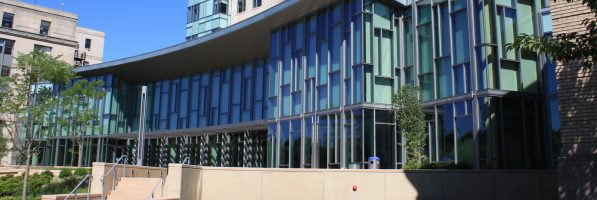The Secret To Finding An Affordable Washington DC MBA

Washington DC may be a top city for students pursuing their MBAs, but the city’s high cost of living could prove prohibitive for many young Mstudents. Growing rent prices over the past ten years have led DC to be one of the least affordable of the major U.S. metropolitan areas.
Of course, MBA students looking to apply their education to governmental agencies won’t find a better place to do so than in the nation’s capital. And though contending with high rent prices may be unavoidable, many business schools offer students a number of ways to keep the cost of their degree at a minimum.
From scholarships to grants and student work opportunities, business schools in Washington DC ensure that low-income applicants can have equal access to the high quality education their program’s provide. Below are just a few of the opportunities provided to assist low-income applicants at Washington DC MBA programs.
Finding An Affordable Washington DC MBA
McDonough School of Business – Georgetown University
Over $1.5 million in aid is available to MBA applicants through merit based scholarships at Georgetown University’s McDonough School of Business. All students are eligible for these grants, but it is advised to apply for the program early to best position yourself for consideration. International students in need of additional funding may also apply for external scholarships and private loans specifically for international students. The university has compiled a list of common lenders that students may want to consider here.
McDonough also provides scholarship opportunities through the Consortium, a group whose goal it is to reduce the under-representation of blacks, Native Americans, and Hispanic students in business education. As a member school, a number of scholarships are also available at McDonough for students admitted as part of the Consortium.
University of Maryland R.H. Smith School of Business
Roughly 85 percent of MBA students at UMD Smith receive merit based awards to help fund their education. Between scholarships, fellowships need-based awards and assistantship opportunities, students have a number of opportunities to reduce their tuition and keep their MBA affordable. Awards such as the Dean’s Award of Smith award provide two years and one-year of full scholarship and fees. Students may also find additional opportunities for scholarships through the university’s organizational partnerships, such as the Forté Foundation or management Leaders for Tomorrow.
YOU MAY ALSO LIKE: Georgetown McDonough Offers New FinTech Elective
George Mason University School of Business
The George Mason University School of Business provides one of the best values in education, demonstrated through the high success rate of alumni and the fact that Mason alumni have the lowest student loan default rates in Virginia.
Mason offers a number of financial aid opportunities through grants, scholarships, work-study employment, and loans. Every year, the school offers millions of dollars to incoming students, including fellowships for graduate students. The Office of Student Financial Aid is dedicated to assisting each student in finding the financial assistance that is needed for their degree.
George Washington University School of Business
The George Washington University School of Business offers a number of different ways for students to reduce the cost of their MBA degree. Each year, graduate students may apply to a number of different fellowships, available through the university as well as private foundations and agencies. At the Office of Graduate Student Assistantships & Fellowships, students can search through these numerous opportunities and see which scholarships best fit their qualifications.
GWU also offers Financial Aid based on the need of each students. Eligible applicants can apply for need-based aid by filing the Free Application for Federal Student Aid (FAFSA).
Howard University School of Business
MBA students at the Howard University School of Business may be eligible both for federal student aid, based on need, and a variety of scholarships, which are given based on merit and other factors. Scholarships range, and may cover up to full-tuition, while others provide partial funding. Howard MBA students may also pursue loans for tuition through the ACCESS Loan Program, Alternative Education Loans, or other private loan services.
Kogod School of Business – American University
The Kogod School of Business at American University ensures that its high quality education can be affordable for all. Roughly 80 percent of all students receive financial aid of some kind, with almost $85 million awarded just to the undergraduate population. Kogod offers both need-based aid and merit scholarships. Students may contact the Graduate Admission Office at Kogod for more information on the scholarships available to them, but all applicants who demonstrate excellent academic credentials will be considered for these honors—a separate application process is not needed.
How Boston Business Schools Help Low-Income MBA Applicants

Anyone planning on earning a postgraduate business degree knows that MBA programs cost a lot of money. In the Boston metro, where the cost of living is already high, the annual cost of an MBA program can reach upward of $100,000 … Ouch! Continue reading…
How Emory Goizueta Helps Underprivileged Students Earn an MBA

When you decide to apply for an MBA program, there are a number of new questions you’ll need to answer. Where would be the best place to earn the degree? What program best fits my career needs? What should I focus my business school studies on?
Among all the other decisions a prospective MBA will need to make, how to pay for the degree may be the last thing on their mind.
It’s no secret that the cost of an MBA—plus the lost income while earning your degree—is intimidating for many prospective students. Many students may choose not to earn an MBA or not to apply to a school that fits their skill and needs due to the price tag. If this seems unjust to you, you’re not alone. Many business schools have committed to making their programs accessible and affordable for low-income students.
The Goizueta Business School at Emory University is just one of those schools, offering a number of loan and scholarship opportunities to help students pay for their degree. Below, we’ve rounded up some of the ways Emory helps to ensure all students—regardless of income—can earn a Goizueta MBA.
How Underprivileged Applicants Can Earn An Affordable Emory MBA
Grants & Scholarships
Grants and scholarships offer students an extremely valuable and all-too-often underutilized opportunity to pay huge portions of tuition without the frustrating proposition of paying it back later. Such funding can be based either on academic merit or financial need.
Tuition Credits: There are a number of tuition credits available for students who fall into specific categories, such as Emory University Alumni, Graduates of the Goizueta Business School Executive Education Program, active duty military and veterans, and applicants working full-time at a 501(c)(3) non-profit. Emory Employees and dependent family members may also be eligible for tuition credits, depending on years of service.
Veteran’s Education Benefits: Veterans and the dependents of veterans may be eligible for monthly education benefits, such as tuition remission. Students looking to receive Veterans benefits who also need additional sources of funding may still do so, and the benefits received will not be considered when determining financial need.
Scholarships: Goizueta offers students the chance to earn a number of potential scholarships based on merit. Many scholarships are offered through partnerships with Atlanta professional organizations. These include:
- Georgia Hispanic Chamber of Commerce: Two $25,000 scholarships
- Department of Health & Human Services: Thirty percent discount on tuition for qualified individuals
- National Association of Asian American Professionals: Two $25,000 scholarships
- Women in Technology: Two $25,000 scholarships
There are also a limited number of honorary scholarships awarded to students after enrollment. The MBA for Executives Class Gift Scholarship, originally endowed by the class of 2005, is offered to students in a professional or field generally underrepresented in the EMBA program. Also available is the Executive Women of Goizueta (EWG) Scholarship, given to accomplished female executives in the Goizueta MBA for Executives program.
Loans
Graduate Loans: Those attending business school are afforded the same federal loan offerings as students starting undergraduate programs. Students may fill out the Free Application for Federal Student Aid (FAFSA) to help determine their financial need and eligibility. Each year, students should fill out a new FAFSA form to reevaluate their need. International MBA students are also eligible for certain types of student loans, which can be explored further here.
Value Without the Price Tag: How MIT Sloan Assists Low-Income MBA Students

It’s no secret that attending an MBA program can often come with a hefty price tag—and when it comes to one of the top MBA programs in the country, you can guarantee you’ll be paying a lot for the high value of that program. At the Sloan School of Management at MIT, rated as the fourth best business school in the country by the U.S. News and World Report, one year of tuition will set you back $68,250. Factoring in additional fees, such as insurance, food and supplies, the cost is upward of $100,000.
For ambitious students with the skills to attend the best-of-the-best MBA programs, it’s a shame that money should be a determining factor in what program they can attend. Thankfully, most business programs work to ensure that all students—regardless of income—are able to attend the program that fits their qualifications. At MIT Sloan, there are a variety of ways for low-income students to qualify for financial aid based entirely on their financial need.
Below are just a few of the opportunities the school provides for low-income students to pay for their MBA, ensuring that the most talented business students can attend their school regardless of finances.
Loans
Once a student is accepted to MIT Sloan, they will begin a three-tiered financial aid process to determine financial need and the best way it can be addressed. The admissions process itself is needs-blind, ensuring that financial circumstance will not be a factor in whether or not a student is admitted to the program.
After admittance, students should file a Free Application for Federal Student Aid (FAFSA) and Graduate Loan Application, which will help determine their eligibility for federal and private loans by working alongside the MIT Student Financial Services.
Assistantships
A number of MBA students each year may also have the opportunity to be a teaching or research assistant. These roles, which may include grading assignments/exams, working directly with students or assisting with research both help students pay for school as well as provide important experience and exposure to the research and education programs at Sloan.
Starting in the second semester, students will also have access to TA and RA positions as well.
Fellowships
Each year, MIT Sloan offers a number of competitive fellowships/scholarship to incoming and second-year MBA students. Although these scholarships are merit-based rather than need, they provide low-income students another excellent opportunity to subsidize their education and often include additional ways to gain experience and improve one’s career.
Aside from the Legatum Fellowship and the MIT Public Service Center Fellowships, which have their own application process, all admitted students to MIT will be considered for fellowships that they are eligible for, and do not require a separate application. The fellowships may range in support from $10,000 to full tuition coverage.
You can find more information about the variety of fellowships offered at MIT Sloan here.
Additional Scholarships
A number of other scholarships are available for students at MIT Sloan that may be given out based on a wide variety of factors such as merit, identity, or nationality. These scholarships may range from funding for tuition and coverage of school-related fees to mentorship and the chance to build relationships with industry professionals. For the most part, these scholarships must be applied to separately after admittance to MIT Sloan. More information on these scholarships can be found here.
Even after need-based loans and assistantships, these scholarships may help further bridge the gap in costs for students attending MIT Sloan. These many opportunities for funding ensure that the most talented students can attend the best-fit school for them, allowing MBAs to focus on getting their degree rather than getting their wallets out.
Financing Your MBA, Part 3

Moving right along in our multi-part series on financing your MBA, we’ll take a look today at some of the options prospective MBA students have for obtaining loans to finance their time at business school. For the purposes of this post, we will focus primarily on loan programs for U.S. students. International students, stay tuned for subsequent posts that will go into greater detail about loan programs tailored for your needs.
